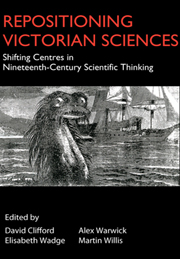Book contents
- Frontmatter
- Contents
- Notes on Contributors
- 1 Margins and Centres
- SECTION I Shifted Centres
- SECTION II Contested Knowledges
- SECTION III Entering The Modern
- 13 Fresnel's Particular Waves: Models of Light as Catalytic Modes of Worldmaking in Early Modern Times
- 14 Re-imagining Heaven: Victorian Lunar Studies and the Anxiety of Loneliness
- ‘You Should Get Your Head Examined’: Freudian Psychoanalysis and the Limits of Nineteenth-Century Science
- 16 Scholars, Scientists and Sexual Inverts: Authority and Sexology in Nineteenth-Century Britain
- 17 Unmasking Immorality: Popular Opposition to Laboratory Science in Late Victorian Britain
- Notes
- Select Bibliography
16 - Scholars, Scientists and Sexual Inverts: Authority and Sexology in Nineteenth-Century Britain
from SECTION III - Entering The Modern
Published online by Cambridge University Press: 05 March 2012
- Frontmatter
- Contents
- Notes on Contributors
- 1 Margins and Centres
- SECTION I Shifted Centres
- SECTION II Contested Knowledges
- SECTION III Entering The Modern
- 13 Fresnel's Particular Waves: Models of Light as Catalytic Modes of Worldmaking in Early Modern Times
- 14 Re-imagining Heaven: Victorian Lunar Studies and the Anxiety of Loneliness
- ‘You Should Get Your Head Examined’: Freudian Psychoanalysis and the Limits of Nineteenth-Century Science
- 16 Scholars, Scientists and Sexual Inverts: Authority and Sexology in Nineteenth-Century Britain
- 17 Unmasking Immorality: Popular Opposition to Laboratory Science in Late Victorian Britain
- Notes
- Select Bibliography
Summary
This essay investigates the shifting centrality/marginality axis of scientific authority in nineteenth-century Britain by comparing two key works of the newly-developed discipline of sexology: Psychopathia Sexualis (1886–1902) written by Richard von Krafft-Ebing and Sexual Inversion (1897) written by John Addington Symonds and Havelock Ellis. Examining the production and dissemination of the two works highlights the contested authorial positions within the new discipline. It reveals that the boundaries between the role of sexologist and that of the sexological case study of the (male) ‘sexual invert’ were fluid. While the concept of ‘sexual inversion’, which was developed by Karl Heinrich Ulrichs, who claimed that same-sex sexuality is a form of gender inversion, theoretically included forms of female ‘sexual inversion’, in this context, it refers to male same-sex love. The psychiatrist, Krafft- Ebing developed new sexual taxonomies and published them in 12 revised editions of his magnum opus on sexuality. Ellis, scientist and literary scholar, is today better remembered for his involvement in the first study in English of same-sex sexuality than its initiator Symonds, a Renaissance scholar, literary critic and self-identified ‘sexual invert’. By comparing the production of Psychopathia Sexualis and Sexual Inversion and their impact on British culture, I hope to unveil some of the forces that shaped the battle for sexological authority in late nineteenth-century Britain. I argue that, unlike in European branches of sexology, which were firmly anchored within scientific tradition, British sexology was partly indebted to the literary realm.
- Type
- Chapter
- Information
- Repositioning Victorian SciencesShifting Centres in Nineteenth-Century Thinking, pp. 197 - 206Publisher: Anthem PressPrint publication year: 2006
- 2
- Cited by



